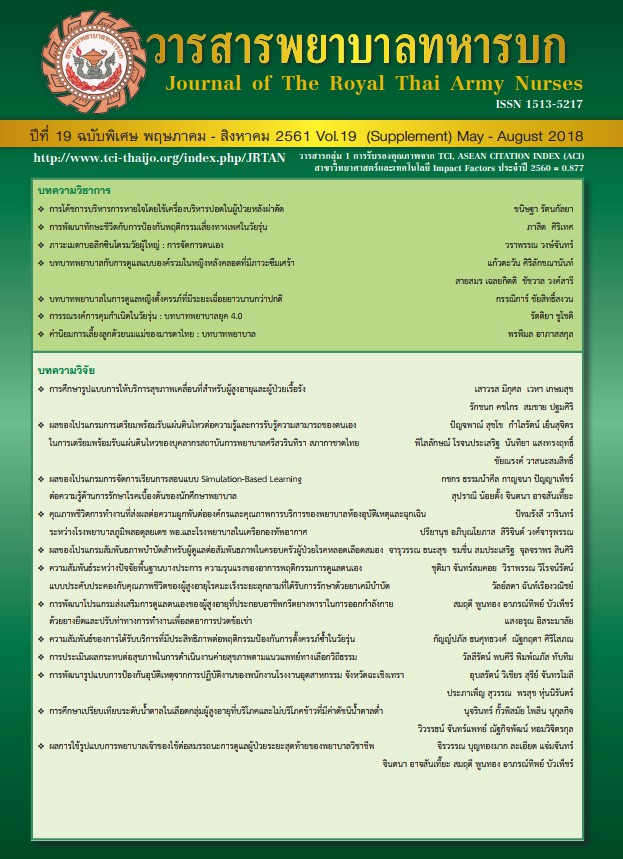Study to Compare Blood Sugar Level among Older Adult People who Consuming and not Consuming Low Glycemic Index Rrice
Keywords:
Consumption behavior, glycemic index, the older adultAbstract
This is a Quasi-experimental Design research with Nonequivalent Control Groups pattern which aimed to compare blood sugar level among older adult people after consuming low glycemic index rice (parboiled rice products ALLOVE). Population is the elders who were served at 6 elderly care centers which are member of the network of elderly care organizations. The sample was 67 elderly within the specific criteria and was divided into 2 groups; 41 for experimental group and 26 for control group. Laboratory recordings of fasting blood sugar test (FBS) were collected for both before and after the experiment, and were analyzed by statistics, percentage, mean, standard deviation and t-test The experimental group was mostly female at the average age of 60-70 years, average weight of 60-70 kilograms and average height of 150-170 centimeters. The first experiment’s results showed that blood sugar level is very high. (148.19 mg/dl) After adjusting dietary habits by using rice with low glycemic index (parboiled rice products: ALLOVE) for a specific period of time. There is a tendency to help reducing blood sugar level by an average of one in four (40.31 mg/dl) from the original sugar level. If used in combination with conventional medicine, it is an option for consumers with high blood sugar. This leads to the dcrease of family expenses in the long run. The 1st and the 2nd blood sugar test compared to the 1st and the 3rd (26.92,40.31 mg/dl) blood sugar test among the experimental group were significantly different in terms of statistic at the level of 0.01. Whereas, the 2nd and the 3rd (13.39 mg/dl) test results were not different. in terms of statistic at the level of 0.01
Downloads
References
Centers for Disease Control and Prevention (2011).Prevalence of diabetes. Retrieved November 20, 2012
Institute Of Geriatric Medicine Department of Medical Services, Ministry of Public Health. Aging society (2009). Retrieved June 20, 2018 (In Thai)
College of Population Studies, Chulalongkorn University (2010). Retrieved June 20, 2018 (In Thai)
Bureau of Epidemiology, Department of DiseaseControl Ministry of Public Health (2012). Chronic Diseases Surveillance Report, 2011. Weekly Epidemiological Surveillance Report 43rd (17) Week. 4-5 (in Thai)
World Health Organization. (2016 a). Fact sheet no. 138. Retrieved December 25, 2016 7. World Health Organization. (2016 b). Global report on diabetes. Retrieved December 25,2016
Ngerntip, T. (2010). The Effect of Knowledge and Experience Sharing for Eating Behavior Modification of Typr 2 Diabetic Patients in Kamalasai Hospital Kalasin Province. Journal of Nutrition, 45(1),175-185. ( in Thai)
Burns, N. Grove, S. (1997). The Practice of Nursing Research: Conduct,Critique and Utilization. 3rded n.WB Saunders Company, Philadelphi. 10. Woraphongsathorn, T. (2000). PublicHealth Research (4thed) Bangkok: Chulalongkorn University Press
Authayanin, W. Bumrourach, S. Nimsuntorn, K. (2013). Herb usage among diabetic patients : primary data for developing diabetic care system in amphur Huaytalang community health development quarterly khon kaen university 1/1 (April-June 2013) (in Thai)
Thongsumrit, D. Borisut, K. Meebunmak, Y. (2017). Effect of Health Behavior Modifying Program on Ability of Self-care among Risk Group of Diabetes Mellitus in Watphleng Subdistrict, Watphleng District, Ratchaburi Province journal of phrapokklao nursing college 28/1 January-June2017
Downloads
Published
How to Cite
Issue
Section
License
บทความหรือข้อคิดเห็นใดใดที่ปรากฏในวารสารพยาบาลทหารบกเป็นวรรณกรรมของผู้เขียน ซึ่งบรรณาธิการหรือสมาคมพยาบาลทหารบก ไม่จำเป็นต้องเห็นด้วย
บทความที่ได้รับการตีพิมพ์เป็นลิขสิทธิ์ของวารสารพยาบาลทหารบก
The ideas and opinions expressed in the Journal of The Royal Thai Army Nurses are those of the authors and not necessarily those
of the editor or Royal Thai Army Nurses Association.






